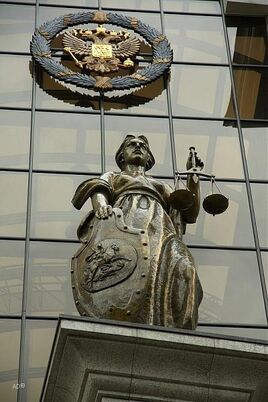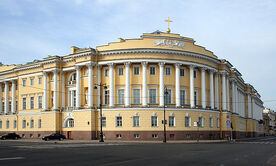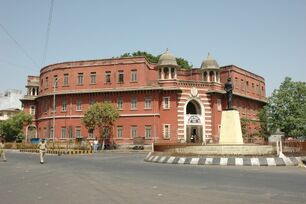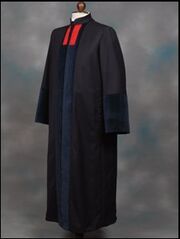
| Empire of Ruthenia |
 This article is part of the series: |
|
|
|
Constitution and Law
The Monarchy
Basileus: Theodoros I Executive
Prime Minister: Vassilis Prevezanos Legislative
Judicial
Political parties
Government Policy
Related Topics
|
The Judiciary of Ruthenia interprets and applies the law of Ruthenia. It is defined under the Imperial law and law with a hierarchical structure with the Imperial Court, Supreme Court, and Supreme Court of Arbitration at the apex. The district courts are the primary criminal trial courts, and the regional courts are the primary appellate courts. The judiciary is governed by the All-Ruthene Congress of Judges and its Council of Judges, and its management is aided by the Judicial Department of the Supreme Court, the Judicial Qualification Collegia, the Ministry of Justice, and the various courts' chairpersons. And although there are many officers of the court, including jurors, the Prosecutor General remains the most powerful component of the Ruthene judicial system.
The judiciary faces many problems and a widespread lack of confidence but has also made much progress in recent times. There have been serious violations of the accepted separation of powers doctrine, systematic attempts to undermine jury trials, problems with access to justice, problems with court infrastructure and financial support, and corruption. But the judiciary has also seen a fairer and more efficient administration, a strengthening of the rule of law, moves towards a more adversarial system, and increased utilization of the justice system.
History[]
The judicial system of Ruthenia, was established by the Konstantinos I, by a Basilika Decree of 20 November 3220. This system — based partly on Mauryan and Parsian models — was built up on certain broad principles: the separation of the judicial and administrative functions, the independence of the judges and courts, the publicity of trials and oral procedure, the equality of all classes before the law. Moreover, a democratic element was introduced by the adoption of the jury system and—so far as one order of tribunal was concerned—the election of judges. The establishment of a judicial system on these principles constituted a major change in the conception of the Ruthene state, which, by placing the administration of justice outside the sphere of the executive power, ceased to be a despotism.
The system established by the law of 3220 was significant in that it set up two wholly separate orders of tribunals, each having their own courts of appeal and coming in contact only in the Senate, as the supreme court of cassation. The first of these, based on the Mauryan model, are the courts of the elected justices of the peace, with jurisdiction over petty causes, whether civil or criminal; the second, based on the Parsian model, are the ordinary tribunals of nominated judges, sitting with or without a jury to hear important cases.
In 3250 the son of Konstantinos made a overhaul and a modernization of Juditial system, changing almost everything in civil and criminal law and separating the ecclesiastical and civil judges in different competence.
Courts[]
Ruthenia has a trifurticated system with imperial, ordinary and commercial courts, the Imperial Court of Ruthenia is considered a separate, independient court. the district courts are the primary criminal trial courts and the regional courts are the primary apellate courts.
The ordinary courts have a four-tiered hierarchy and are responsible for civil and criminal cases:
- the Supreme Court of Ruthenia,
- regional courts,
- district courts, and
- magistrate courts.
The commercial courts consist of the:
- Supreme Court of Arbitration of Ruthenia, and
- commercial arbitration courts.
In 3245, the courts sentenced about 1 million people for criminal offenses, and considered 3 million administrative offenses and 2.5 million civil cases.
Imperial Court[]

The Imperial Court of Ruthenia
The Imperial Court of Ruthenia (Symvoulio tis Epikrateias) is responsible for cases concerning conformity with the Imperial Law, judicial disputes between 2 or more Imperial bodies, between a imperial body and a member of the Empire, and between members of the Empire. As such, it practices "Imperial review" (as differentiated from judicial review) and decides whether Imperial laws, presidential decrees and directives, and local constitutions, charters, and laws comply with the federal law, as well as treaties between the national government and a regional governments and between regional governments.
It is composed of 19 judges, and may sit in plenary sessions but is otherwise divided into 2 chambers. The Imperial Court consists of two chambers with 10 and 9 judges respectively. The Chairman presides over one of the chambers, the Deputy Chairman presides over the other chamber.
Imperiality of laws, disputes concerning competence of governmental agencies, impeachment of the Basileus, and Imperial Court's proposals of legislation must be dealt with by the plenary session. The Imperial Court may also submit to the plenary session any other issue at its discretion.
In general, the court hears cases referred by the Basileus, the Council of Ministers, the Parliament, one-fifth of the members of either chamber of the Assembly, the Government, the Supreme Court, or other bodies of legislative or executive authority. It also hears complains by citizens of allegations of constitutional rights violations.
Supreme Court[]
The Supreme Court of Ruthenia (Ανώτατο Δικαστήριο της Ρουθηνία) is the highest court, and supervises inferior courts of general jurisdiction. It occasionally sits as a court of first instance in cases where important interests of state are at issue; in this case it normally consists of a judge and a jury, but occasionally consists of three judges.
There are 115 members of the Supreme Court. At plenary sessions the Supreme Court studies the judicial decisions of lower courts on various topics and adopts resolutions, which establish recommendations on the interpretation of particular provisions of law for lower courts for uniform application.
The Presidium of the Ruthene Supreme Court represents Ruthenia's final court of appeal. The Presidium consists of thirteen judges: the Chairman of the Supreme Court, its first deputy chairman, its six deputy chairmen and five other Supreme Court judges. Only the Prosecutor General has the right to appeal to the Presidium, and as a result, very few criminal cases reviewed by the three-judge panels of the Supreme Court make it to the Presidium. Only 0.4% of criminal cases in 3248 ended with an acquittal in the Presidium.
The court is divided into several chambers or scholeía (σχολεία), and each chamber normally sits with three judges:
- civil;
- criminal;
- military;
- administrative; and
- appeals, which can review decisions of the other chambers.
There are several entities attached to the Supreme Court. The Academic Consultative Council (Ακαδημαϊκό Συμβουλευτικό Συμβούλιο) assists the court in various legal and academic matters and comprises members of the Supreme Court itself, academics, practicing lawyers, and law enforcement officers. The members of the Academic Consultative Council are elected at plenary sessions of the Supreme Court. The Judicial Department is responsible for administration of the courts.
Regional Courts[]
Regional courts (also called Eparchis courts and city courts) are the courts at the regional level, though are not all named as such. This includes the supreme courts of the Empire, courts of the Eparchis around the empire.
The courts sit as both courts of first instance and appellate courts. As courts of first instance, they hear more complex civil cases and serious criminal cases. A judge and a jury, or alternatively 3 judges, hear these cases. As appellate courts, they hear decisions of district courts that have not yet entered into force, and consist of 3 judges.
District Courts[]

District Court in Menelogion
District courts, are primarily courts of first instance but sometimes hear appeals from magistrate courts. They are formed in areas, urban areas, and cities. Decisions of the court are appealed to the regional court.
As courts of first instance, they handle criminal cases where imprisonment is for more than 3 years, and consist of 1 judge and a jury where required. As courts of appeal from decisions of the magistrate courts consisting of 1 justice of the peace, they consist of 1 judge and retry the case.
Magistrate Courts[]
Magistrate courts (also called Justices of the Peace Courts) handle criminal cases where imprisonment is for less than three years such as petty hooliganism, public drunkenness, and serious traffic violations of a non-criminal nature, minor civil cases such as simple divorces, some property cases, disputes over land, and some labor cases, as well as some federal administrative law cases. The magistrate courts were expected to hear two-thirds of all civil cases and close to 100,000 criminal cases. It consists of one magistrate or justice of the peace.
Arbitration Courts[]
Arbitration courts (also called commercial courts) hear cases dealing with a wide matter of contractual issues, such as rights of ownership, contract changes, performance of obligations, loans, bank accounts, and bankruptcy. They operate independently of the other courts. The Supreme Court of Arbitration of Ruthenia (also called the Supreme Commercial Court, or the Supreme Arbitration Court) is the highest such court, and consists of 1 chairman and 4 deputy chairmen.
Ecclesiastical Courts[]
Two important classes in Ruthenia stood more or less outside the competence of the above systems: the clergy and the peasants. The ecclesiastical courts had a jurisdiction over the clergy with its specific procedure. Their interest for the laity lies mainly in the fact that marriage and divorce fall within their competence.
They can apply to the police commissaries (epimeli̱tés) or to the justices of the peace; but the great distances to be traversed in a country so sparsely populated makes this course highly inconvenient. On the other hand, from the Ecclesiastical court there is no appeal, unless it has acted ultra vires or illegally. In the latter case a court of cassation is provided in the district committee for the affairs of the peasants and clerics.
Administration[]
The Judicial Department of the Supreme Court of Ruthenia is responsible for administration of the courts, such as selection and training of judicial candidates, working with law institutes, and qualifications of judges and other court officers. It is expected to enhance the independence of the judicial branch. It also supports the Council of Judges and the Supreme Qualifying Collegium.
Judicial Qualification Collegia are bodies of judicial self-regulation that were established at the regional (Judicial Qualification Collegia) and national (Supreme Qualification Collegium) levels. They play a key role in the appointment, promotion and dismissal of judges.
Some judges serve as a court chairperson. The court chairperson is solely responsible for the allocation of cases to judges, has considerable powers in the matters of appointment, and makes the initial recommendation for disciplinary measures, in particular dismissal.
Officers[]
Judges[]

Hellene Black Robe
Judges are appointed by the Imperial Council and serve for life. Candidates are recommended by the Qualification Collegia / Supreme Qualification Collegium to the Prime Minister, who in turn recommends candidates to the Imperial Council.
The judges of the Court of Cassation are nominated by the Basileus and appointed by the Imperial Council for 12 years, and the judges must be at least 40 years old and must retire at 70 years old. The also must have served as a lawyer for at least 15 years and have a "recognized high qualification" (quotation from Cassation Court Act) in law.
The Ruthene Minister of Justice is responsible for appointing judges to regional and city courts; however, in practice, many appointments below the national level still are made by the chief executives of subnational jurisdictions.
Judges of the district courts are appointed by the Basileus. A candidate must be at least 25 years old, is expected to have received a higher legal education (commonly a specialist degree), have at least 5 years of experience in the legal profession, and pass an examination from the Ministry of Justice.
Justices of the peace are usually appointed by the regional legislature, but may also be elected. Justices of the peace require most of the same qualifications, the judges when they are elected, they give a special robe with purple ends, representing the judge is the voice of the basileus justice
Prosecutors[]
The Prosecutor General of Ruthenia is the highest prosecutor in Ruthenian Empire, and both he and his office are independent from the executive, legislative and judicial branches of power. The Prosecutor General remains the most powerful component of the Ruthene judicial system.
The Prosecutor General is entrusted with:
- prosecution in court on behalf of the State;
- representation of the interests of a citizen or of the State in court in cases determined by law;
- supervision of the observance of laws by bodies that conduct detective and search activity, inquiry and pre-trial investigation;
- supervision of the observance of laws in the execution of judicial decisions in criminal cases, and also in the application of other measures of coercion related to the restraint of personal liberty of citizens.
The Prosecutor General is nominated by the Basileus and appointed by the majority of Imperial Council for a term of five years. If the nomination fails, the Basileus must nominate another candidate within 30 days. The resignation of the Prosecutor General before the end of his term should be approved by both a majority of Imperial Council and the Basileus.
Abvocates[]
The Hellene legal profession is unregulated, but there have been moves towards unification and regulation recently. Anyone with a legal education can practice law, but only a member of the advocacy (syni̱goría) may practice before a criminal court. Legal education has traditionally begun with the specialist degree in law (ειδικό πτυχίο Νομικής). An "advocate" is an attorney who has demonstrated qualification and belongs to an organizational structure of advocates specified by law, known as being "called to the bar" in commonwealth countries.
An examination is administered by the qualifications commission of a court for admission to its Synigoría. To sit for the exam, one must have a higher legal education (commonly a specialist degree) and either two years of experience in legal work or a training program in a law firm. The exam is both written and oral, but the main test is oral. The qualifications commission is composed of seven advocates, two judges, two representatives of the regional legislature, and two representatives of the Ministry of Justice.
In 3228 there were 25,000 lawyers, and in 3230 there were 47,000 defense lawyers in all the empire.
Jurors[]
A juror must be 25 years old, legally competent, and without a criminal record.
Law[]
The judiciary is primarily regulated by the Imperial Family and the Imperial Code, the Code of Criminal Procedure, and the Ecloga of the Empire. The Ecloga states that the judicial branch is independent of the legislative and executive branches, but there have been serious violations of the accepted separation of powers doctrine.
There is no usage of precedent, as used in common law legal systems. As such, the law on appeal may depend on the composition of the chamber deciding the appeal. A chamber normally consists of 3 judges, out of the dozens of judges within the court (19 in the Imperial Court, 115 in the Supreme Court). Without the legal principle of stare decisis, for each case a chamber may come to a different, even contradictory, conclusion, even compared to chambers within the same session. If they come to relatively consistent decisions, those in civil law legal systems call this jurisprudence constante.
Criminal Procedure[]
For serious and specific crimes, the accused have the option of a jury trial consisting of 12 jurors. The crimes that may be tried by a jury are murder, kidnapping, rape with aggravating circumstances, child trafficking, gangsterism, large-scale bribery, treason, terrorism, public calls for violent change in the Imperial system or for the seizure of power, and select other crimes against the state.The Imperial Code stipulates that, until the abolition of the death penalty, all defendants in a case that may result in a death sentence are entitled to a jury trial.
Jurors are selected by the prosecution and defense from a list of 30-40 eligible candidates. They are similar to common law juries, and unlike lay judges, in that they sit separately from the judges and decide questions of fact alone while the judge determines questions of law. They must return unanimous verdicts during the first 3 hours of deliberation, but may return majority verdicts after that, with 6 jurors being enough to acquit. They may also request that the judge show leniency in sentencing.
Everyone has the right of legal assistance. The accused have the right to a defense lawyer from the time they are detained, put in custody, charged, or declared a suspect. According to the 3249 Code of Criminal Procedure, defense lawyers can participate in investigations with the consent of the prosecutor, meet privately with a client, collect evidence independently of the prosecutor, identify defense witnesses, present expert witnesses, be present for all court procedures, access to the prosecutions evidence after the investigation, and to file appeals regarding court procedures.
See Also[]
| ||||||||||||||||||||||||||||||||||||

